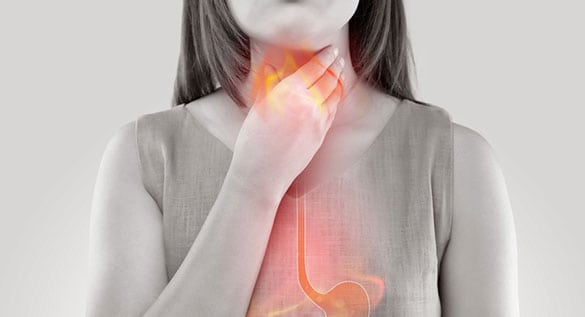
Laryngopharyngeal reflux (LRP) is a condition that occurs when stomach acid travels back up the esophagus.
LRP is sometimes referred to as “silent reflux” because it can be difficult to diagnose due to the absence of symptoms. It typically occurs in patients who have a similar condition known as gastroesophageal reflux disease (GERD). When acid from the stomach reaches the throat, it’s called LRP.
Often manageable, this type of reflux sometimes requires attention from an ear, nose, and throat specialist.
What Causes Laryngopharyngeal Reflux
Normally, thick rings of muscle (sphincters) keep stomach acid where it belongs. With LRP, these muscles aren’t functioning properly. The condition is more common in infants since sphincter muscles aren’t yet developed. Being overweight can also increase the risk of developing problems with stomach acid in the throat. Wearing tight or binding clothing, having consistently high stress levels, and eating acidic or spicy foods that can cause heartburn are among other possible contributing factors. Symptoms associated with LRP include:
- Chronic coughing
- Hoarseness that’s usually mild
- Noisy breathing
- Frequent throat clearing
- Difficulty swallowing
- Recurring sore throats
- Feelings of having a lump in the throat that won’t go away after swallowing


How Is It Diagnosed?
It’s usually when patients with GERD start experiencing throat irritation without a clear cause that a referral is made to an ENT doctor. Diagnosis may involve an endoscopic exam that provides a direct view of the throat and vocal cords, or a pH test where a patient wears a special device that uses a small catheter and senors to detect acidity for a 24-hour period. Another option is a swallowing study in which a special liquid is ingested to trace the movement of food from the mouth to the esophagus. Additional testing may be done to rule out cancer as a possible source of symptoms.
Treatment Options for LRP
Infants with laryngopharyngeal reflux may benefit from more frequent and smaller feedings or medications that may include proton pump inhibitors or H2 blockers. Recommendations for adults with LRP sometimes include making changes to diet habits, chewing gum to increase saliva production to neutralize stomach acid, and using antacids if discomfort is generally mild. In addition to H2 blockers, treatment for adults might include:
- Sucralfate to protect irritated mucous membranes
- Prokinetic agents to place added pressure on the lower esophageal sphincter
- Changes to medications being taken for other conditions that may be contributing to LRP
Is Surgery an Option?
Surgery is usually a last resort as a treatment for LRP and only suggested if medications and lifestyle changes aren’t effective. One procedure involves the placement of a ring of titanium beads around part of the lower esophagus. The purpose is to add enough strength to provide a stronger seal while still allowing food to get through when eating. Often done with minimally invasive, laparoscopic techniques, fundoplication is a procedure where the upper part of the stomach is wrapped around the lower esophagus to prevent stomach acid from reversing directions.
While it’s often possible to keep issues with laryngopharyngeal reflux in check, it’s not a problem that should be ignored. “Silent reflux” that’s left untreated may contribute to throat damage that may affect your voice. It can also aggregate symptoms associated with asthma, emphysema, bronchitis, and other respiratory conditions. As is the case with GERD, LRP can sometimes be prevented by maintaining a healthy weight, avoiding excessive alcohol consumption, and cutting back on foods that tend to increase stomach acid production.


